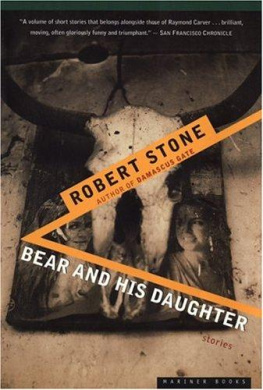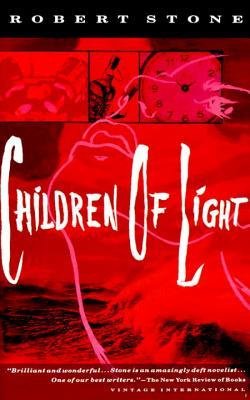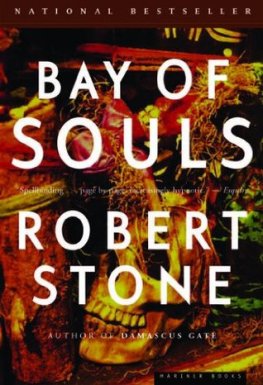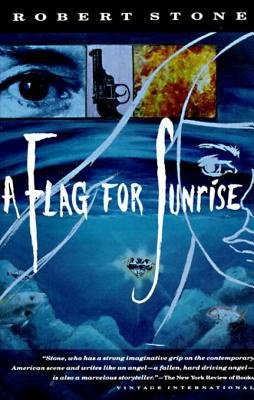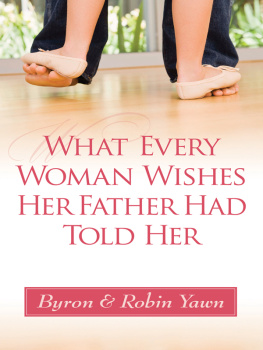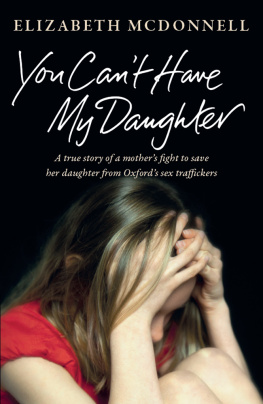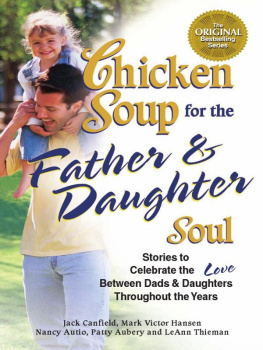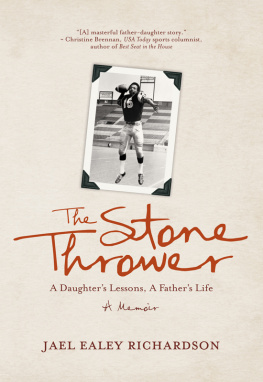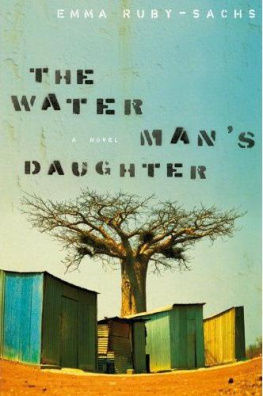Bear and His Daughter
Robert Stone
Table of Contents
A MARINER BOOK
HOUGHTON MIFFLIN COMPANY
BOSTON NEW YORK
First Mariner Books edition 1998
Copyright 1997 by Robert Stone
ALL RIGHTS RESERVED
For information about permission to reproduce selections
from this book, write to Permissions, Houghton Mifflin Company,
215 Park Avenue South, New York, New York 10003.
Library of Congress Cataloging-in-Publication Data
Stone, Robert.
Bear and his daughter : stories / Robert Stone,
p. cm.
Contents: MiserereAbsence of mercyPorque no tiene,
porque le faltaHelpingUnder the pitonsAquarius
obscuredBear and his daughter.
ISBN 0-395-63651-3
ISBN 0-395-90134-0 (pbk.)
I. Title.
PS 3569. T 6418 B 43 1997
813.54 dc20 96-36737 CIP
Printed in the United States of America
Book design by Robert Overholtzer
EB 10 9 8 7 6 5 4 3
The following stories in this collection originally appeared
elsewhere: Miserere, The New Yorker; Absence of Mercy,
Harpers Magazine; Porque No Tiene, Porque Le Falta,
New American Review; Helping, The New Yorker; Under
the Pitons, Esquire; Aquarius Obscured,
American Review.
for JANICE
Contents
MISERERE /
ABSENCE OF MERCY /
PORQUE NO TIENE, PORQUE LE FALTA /
HELPING /
UNDER THE PITONS /
AQUARIUS OBSCURED /
BEAR AND HIS DAUGHTER /
MISERERE
M ARY URQUHART had just finished story hour at the library when the muted phone rang at the circulation desk. She had been reading the children Prince Caspian.
Camille Innaurato was on the line and as usual she was beside herself.
Mary, Mary, so listen Camille began. It sounded almost prayerful. Then Camille began to hyperventilate.
Oh, Camille, Mrs. Urquhart said. Try to be calm. Are you all right, dear? Do you have your inhaler?
I have more! Camille croaked fiercely at last. The force of the words in her constricted throat made her sound, Mary Urquhart thought, like her counterpart in Traviata.
More? Although Mary knew at once what Camille meant, she needed the extra moment of freedom.
More babies! Camille shouted. She spoke so loudly that even with the receiver as close to her ear as she could bear, Mary Urquhart thought that everyone around the circulation desk must be able to hear her voice on the phone, its unsound passion.
My brother, he found them! cried Camille. And he took them here. So I got them now.
I see, said Mary Urquhart.
Outside, Mrs. Carter; the African-American head librarian, was supervising the reuniting of the story-hour children with their mothers. The children were, without exception, black and Hispanic. The mothers of the black children were mostly West Indian domestics; they were the most scrupulous of the story-hour mothers and they loved their children to have English stories, British stories.
Mary Camille gasped over the phone. Mary?
Outside the library windows, in the darkening winter afternoon, the children looked lively and happy and well behaved and Mary was proud of them. The mothers were smiling, and Mrs. Carter too.
Easy does it, said Mary Urquhart to her friend Camille. For years after Mary had stopped drinking, she had driven around with a bumper sticker to that effect. Embarrassing to consider now.
Youll come, Mary? You could come today? Soon? And we could do it?
The previous year Mrs. Urquhart had bought little books of C. S. Lewis tales with her own money for the children to take home. That way at least some might learn to read them. She liked to meet the mothers herself and talk with them. Looking on wistfully, she wished herself out on the sidewalk too, if only to say hello and remind herself of everyones name. But Mrs. Carter was the chief librarian and preempted the privilege of overseeing the dismissal of story hour.
Yes, dear, Mary said to Camille. Ill come as soon as we close.
They closed within the hour because the New Jersey city in which Mary worked had scant funds to spare for libraries. It was largely a city of racial minorities, in the late stages of passing from the control of a corrupt white political machine to that of a corrupt black one. Its schools were warrens of pathology and patronage. Its police, still mainly white, were frequently criminals.
Mary Urquhart looked carefully about her as she went out the door into the library parking lot for the walk to her old station wagon. It was nearly night, though a faint stain of the day persisted. At the western horizon, across the river and over the stacks and gables of the former mills, hung a brilliant patch of clear night sky where Venus blazed. Some of the newer street lights around the librarys block were broken, their fixtures torn away by junkies for sale to scrap dealers. There were patchy reefs and banks of soiled frozen snow on the ground. Not much had fallen for a week, but the weather was bitter and the north-facing curbs and margins were still partly covered.
Thou fair-haired angel of the evening, Mary recited silently to the first star. She could not keep the line from her mind.
Temple Street, the road Mary drove toward the strip that led her home, was one of crumbling wooden houses. In some of them, bare lights glowed behind gypsy-colored bedspreads tacked over the taped windows. About every fifth house was derelict and inside some of these candlelight was already flickering. They were crack houses. Mary had worked as an enumerator in the neighborhood during the last census and, for all its transience, she knew it fairly well. Many of the houses were in worse condition inside than out. The official census description for all of them was Dilapidated. A few of her story children lived on the street.
The odd corner had a bodega in a cinderblock building with a faint neon beer sign in its window. The cold had driven the brown-bagging drinkers away from the little strip mall that housed Mashonas Beauty Shoppe, a cheap lamp store and a takeout ribs joint called Floyds, which kept erratic hours. All the shops closed at dusk and God knew, she thought, where the alcoholics had gone. Maybe out of the bitter wind into the crack houses. Mary knew a lot of the older alcoholics who hung out there by sight and sometimes, in daytime, she stopped for Floyds ribs, which were not at all bad. Floyd, who always had a smile for her, kept a sign over his register that read CHRIST IS THE ANSWER.
She had an ongoing dialogue with a few of the men. Those who would speak to a middle-aged white woman like herself called her Mary and sometimes, in the case of the beat old-timers from down home, Miss Mary. She had begun by addressing them all as sir, but she had soon perceived that this offended them as patronizing and was not appropriate to street banter. So, if she did not know them by name, she addressed them as guy, which amused them. It was how her upper-class Southern husband had addressed his social equals. He had used it long before one heard it commonly; he had been dead for thirteen years.
I know your story, guy, she would say to a brown-bagging acquaintance as she carried her paper container of ribs to the car. Im a juicehead. Im a boozer.
But you gotta enjoy your life, Mary, an old man had said to her once. You aint got but one, chere?
And that had stopped her cold.
But thats it, she had told the man. Youre so right.
He had shaken his head, telling her really, well, shed never understand. Her life and his? But shed persisted.
Thats why I dont have my bottle today as you do. Because there was a time, guy. Yes, you best believe it.
Then hed heard her vestigial Southernness and cocked his head and said, in a distinctly sarcastic but not altogether unfriendly way, Do it right, Mary. You say so.

